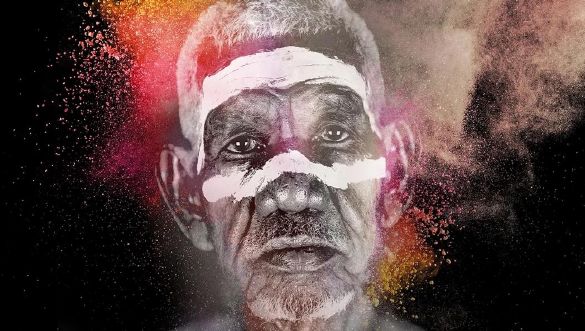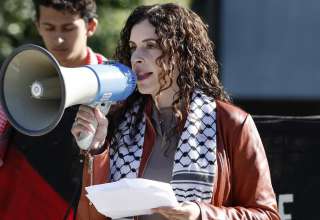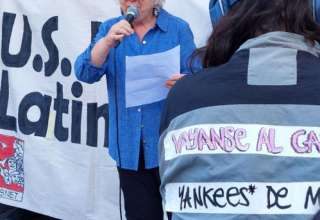Film review by Wallace McKitrick
Released in 2024 after several years of interviews and filming, Luku Ngarra: the Law of the Land has been made by Yolŋu [Yolngu] people of northern Arnhem Land with director Sinem Saban, a longtime friend. The central figure in this powerful film is Reverend Doctor D. Gondarra, senior Law custodian of the Dhurili Nation Clan of the Yolŋu peoples and a lifelong activist for Indigenous rights and self-determination and social justice for all.
Born in 1945, Dr Gondarra passed away in June 2024 after long illness. His immediate family have permitted use of his image and surname, but in accord with custom, his personal name is not to be used for a defined period.
A founder of the Arnhem Land Progress Association (ALPA) set up by Yolŋu, Dr Gondarra chaired the association for thirty years, 1993- 2023. He guided it, ‘from a retail organisation with just eight small stores, that was in a financially precarious position with limited resources, to the largest and most diverse Aboriginal Corporation in Australia. His contribution cannot be understated in the corporation’s development and the service the Corporation offers its members. His ability to operate cross-culturally and connect with all peoples globally saw him sought out by Government and industry alike from around the country.’ (See ALPA website at https://www.alpa.asn.au/news/alpa-mourns-the-loss-of-former-chairperson-and-dhurili-leader-revered-dr-d-gondarra-oam )
The website adds that ‘Rev Dr D. Gondarra OAM was the first ordained Yolŋu Minister in the Uniting Church in Australia on the 24th of November 1976. He was also the Uniting Church Northern Synod Moderator (Territory leader) from 1985- to 1987. [He was] awarded an Order of Australia Medal (OAM) in 1995 for services to the Uniting Church, [and] a Doctorate from the World University Round Table in Arizona in 1991 in recognition of his publications in Christian and cross-cultural education. He dedicated his life selflessly to the service of his people and to advancing the cause of First Nations people from across the nation and the world. His leadership and commitment to improving the social and economic well-being of First Nations people was immeasurable.’
In the film we learn that Gondarra’s upbringing in a Methodist mission, even as he learnt his inherited role as a traditional lawman, led him to seek personal integration of these different cultural philosophies. He managed to do so in a way that brought out his intellectual strengths, deep humanity and pastoral care skills. In his capacity as a minister, he travelled to several overseas countries for educational exchanges and conferences, establishing a reputation as an original thinker and a champion of the sovereignty of all Indigenous peoples. Within his Yolŋu communities he inspired continued practice of traditions that nourish human life and community solidarity in ecologically sustainable ways.
One aspect of his activism was negotiation with Northern Territory legislators, senior police and lawyers about potential recognition of elements of Yolŋu customary law within ‘Westminster’ law. Just as a positive result was likely, the federal Howard Government initiated in 2007 the NT ‘Emergency Response’ or Intervention, more properly characterised by Gondarra as a brutal return of armed colonialism and theft of land. The prospect of law reform sank out of sight, deeply upsetting Gondarra and his companions in that initiative.
The film’s director, Sinem Saban, has been connected with Yolŋu of northeast Arnhem Land for more than 20 years. She directed the award-winning documentary on Indigenous rights, Our Generation (2010). In her director’s statement at https://www.lukungarrafilm.com/about-the-film she writes, Luku Ngarra ‘offers viewers a fascinating exploration of their customary law and how it has kept Yolŋu people in balance with the environment and with each other for tens of thousands of years. Following true to Dr Gondarra’s well known straight talk, he and many other Yolŋu present how their law has been completely at odds with the dominant mainstream paradigm which has in effect created chaos in their lives and the environment.’
Dr Gondarra unerringly saw the violence underlying the nation called ‘Australia’. Through Gondarra, a daughter and other speakers, and historical and current footage of Yolŋu community life, the film asserts and illustrates five core political messages. These may be summarised as follows:
1. Prior to European armed intrusion and occupation of this continent, Indigenous cultures had their own sophisticated economies based on ‘natural farming’ (not ‘nomadic hunting and gathering’ as often claimed by non-aboriginal anthropologists), extensive trade, care of all interlocking elements of their terrain, and ceremony ensuring the health of the metabolic relationship between human society and its ecological nest. Diplomatic and political relationships among the hundreds of distinct language groups were also sophisticated and generally mutually beneficial. Multi-lingualism was the norm, allowing respectful interaction, intermarriage and sharing of ceremonies with neighbouring sovereign cultures (‘nations’).
2. Armed invasion and take-over of Indigenous lands and waters, accompanied by all forms of violence including attempted extermination in many regions, is properly named by Gondarra as ‘settler colonialism’ comparable to that in, for example, north America, parts of Africa and Aotearoa-New Zealand.
3. Indigenous cultures never surrendered or ceded their lands and waters to the invader. Invasion, occupation, surveillance, and suppression of intergenerational transmission of languages and life-ways remain the fundamental basis of present-day relations between First Peoples and the Australian state. Indigenous Law holds knowledge and land-care practices which can help to heal ecological systems and promote truth-telling and social justice.
4. Armed force remains the central fact of modern Australian political arrangements for all Australians – not only for First Peoples. This has been increasingly clear as liberal-democratic ideology and conventions have been dismantled in favour of more direct control of our population by police, state intelligence services and the military on behalf of the most powerful sections of capital.
5. Current trends in Australia, as in many other parts of the world, are hastening the impoverishment and oppression of all peoples and classes other than those who control the institutionalised armed force. Continuation of the settler-colonial mentality and its rapacious practices serves us all badly. It is a road to ruination of the biosphere and even worse social division and injustice. Alliance of the majority of Australians with First Peoples is in everyone’s interest if we are to have a stable, fair economy and shared society. Good relations with other societies in our region and the world depend on this also.
Thus Dr Gondarra’s analysis deftly connects historical British imperialism, Australian settler-colonialism, and modern imperialism’s intensified exploitative practices, while sketching some essential ingredients of a people’s liberation movement.
The rather ‘dry’ summary presented above doesn’t do justice to the warm humanity and humour of Gondarra and other presenters, or to the joy of collective community ceremonies and food preparation. It’s a vibrant film emphasising opportunities for positive change.
True to the sovereignty commitment of Yolŋu, funds for the making of the film have been raised from independent contributions, the Arnhem Land Progress Association, Aboriginal Resource Development (ARDS) and from director Sinem Saban herself. Distribution is through independent cinemas and other regional networks. (See https://www.lukungarrafilm.com/screenings )
Luku Ngarra is an important, timely film. It will assist sincere viewers in understanding something of Yolŋu history and values, and a great deal about the realities of ongoing settler-colonialism in this continent.





